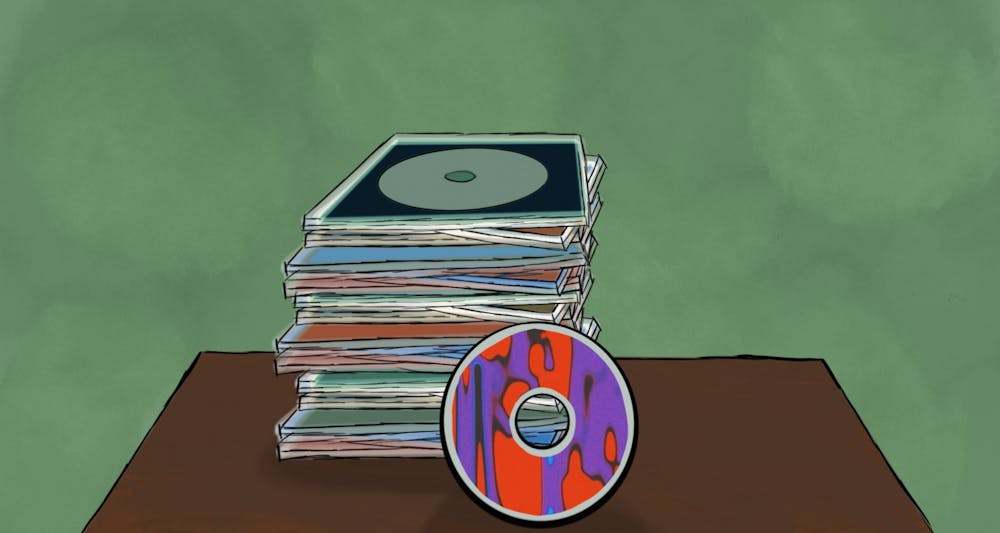As midterms approach and the fall air gets crisper, music becomes increasingly vital to soothe an aching brain, warm the spirit and offer a cheap vacation from the looming chaos of life.
Here are four soulful and nostalgic tracks — some old and some new — that slow down time when it seems to be moving too fast.
“Sunshine (feat. Fousheé)” by Steve Lacy
“Sunshine (feat. Fousheé)” is an underrated gem off Steve Lacy’s “Gemini Rights,” which took the world by storm after its release this past July thanks to the indie-R&B hit “Bad Habit,” which became the first song to ever top Billboard’s R&B/Hip-Hop and Rock & Alternative charts simultaneously.
“Sunshine (feat. Fousheé)” follows a conversation between two ex-lovers as they awkwardly yet assertively dance around each others’ words. Lacy sings in the first verse, “Caught me off guard when I saw you last week / Oh-so tough, but you bluffed when you had me,” to which Lacy’s feature — indie-R&B artist Fousheé — responds, “You’re taking it just as hard / Criticize me all you want.”
Fousheé’s gritty, emotive vocal cracks make her voice feel exposed as she drifts into the chorus, a calm, confident confession of the lines, “But I’m always gonna be / Where you are.” Meanwhile, Lacy’s ethereal, airy falsetto harmonies add a delicate fullness to the vocal stack, representing the fragility of the pair’s dangerous yet inevitable unity.
Lacy — former guitarist and vocalist for the alternative R&B group The Internet — is a leading creative force in the increasingly popular indie-R&B landscape, known for his mastery of addictively beautiful riffs and extensive harmony stacks. Lacy’s flamboyant style, guitar chops and psychedelic genre-fusion make him akin to a modern-day Prince.
The woozy and seductive track is a must-know with Lacy’s “Give You The World” tour approaching, set to cross through Richmond Oct. 19.
“Mariella” by Khruangbin & Leon Bridges
After neo-soul singer-songwriter Leon Bridges’ spontaneous visit to Crozet Pizza post-performance at Ting Pavillion in May, a widespread wave of FOMO crashed upon all those among the student body who missed the seemingly mythical event. Fortunately, Leon Bridges’ and Khruangbin’s discography may suffice to ease the pain.
“Mariella” comes off Khruangbin and Bridges’ second joint EP, “Texas Moon,” a collection of mellow, reverb-soaked tracks that feel like driving a vintage Camaro through the desert. Khruangbin’s trademark groovy bass lines and bluesy guitar riffs seem to communicate in a call-and-response pattern with Bridges’ warm, soulful voice as he confronts his loneliness, wondering where his beloved Mariella ran off to.
“Any Colour You Like” by Pink Floyd
“Any Colour You Like” is the 8th track off one of the best-selling albums of the 20th century, Pink Floyd’s “Dark Side of The Moon” — a progressive rock concept album from 1973.
The track is a three-and-a-half-minute psychedelic whirlwind. Oscillating synthesizers pan from one ear to the other, interweaving with scattered, funky guitar licks that culminate in a thoughtful, intense guitar solo from David Gilmour. Matching the record’s commitment to dystopian lyricism, the track’s instrumentals are profound and grandiose.
While lead singer and bassist Roger Waters is celebrated for his deep lyrical themes exploring humanity, materialism, time and insanity, “Any Colour You Like” is an exclusively instrumental track. It is speculated that the title is a reference to industrialist innovator and automotive giant Henry Ford, who once stated that due to his reliance on the assembly-line manufacturing model, a customer may purchase “a car painted any color that he wants so long as it is black.” The song is thus a comment on uniformity and the illusion of choice, a common critique of capitalism that remains relevant today.
The track is sure to induce a brief, meditative transcendence of consciousness, allowing listeners to float above worldly worries and mountains of school work.
“Runnin’” by The Pharcyde
“Runnin’” is one of several hit singles by The Pharcyde, an alternative hip-hop group based out of LA in the 90s. Producer J Dilla sampled a soothing guitar loop off a Brazilian jazz record to create a trippy instrumental backing, which has since been sampled by Juice WRLD on “Make Believe” in 2019.
“Runnin’” is as innovative as it is lyrically adept. The song is in part a testament to growing up, getting older and dealing with life’s hardships on one’s own. The Pharcyde’s Fatlip, Slim Tre Kid and Imani use a series of reflections upon their days getting picked on in grade school to connect to a larger theme of courage, reinforced by a palliative, melodic chorus that echoes the line, “Can’t keep runnin’ away.”
The song's lyrical complexity peaks as Slim Kid Tre delivers the lines, “As a victim I invented low-key / Till the keyhole itself got lower than me / So I stood up and let my free form form free.” Tre analyzes his former victim-complex, confessing how he lost himself in his own withdrawal until he gained the confidence to stand up for himself without fear of the strength of his opponent. The Pharcyde inspires listeners to stay resilient under pressure, an indispensable mantra to meditate on for college students.
Studies can become all-consuming and isolating — it is important to pop this energy-absorbant bubble using music’s sedative sonic powers and fall back to earth from time to time.
On Repeat is a bi-weekly column from the Arts & Entertainment desk that provides readers with songs related to the University student experience, from toughing it through finals season to walking around Grounds and more.







